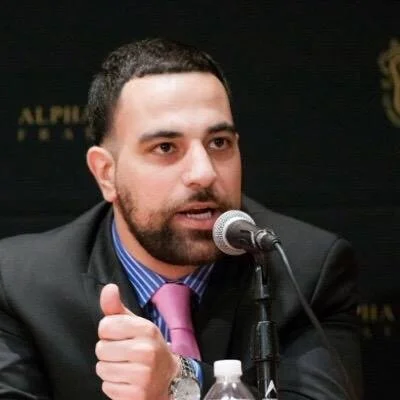Get to know Sam Rasoul, the Palestinian aiming to be Virginia’s next Lt. Gov.
The following was originally published in Palestine in America’s 2021 Politics Edition. Order a print copy, download the digital version or subscribe today!
Palestinian America Salaam “Sam” Rasoul is running for lieutenant governor of Virginia.
He is a member of the Virginia House of Delegates, representing District 11. He took office in 2014, and his term ends in January 2022.
The Democratic primary for Virginia’s lieutenant governor will take place in June and the general election will be Nov. 2. Rasoul took some time to answer Palestine in America’s questions about his background, political work, and his goals.
Palestine in America (PiA): What balad(s) is your family from?
Sam Rasoul (SR): My father is from Al-Bireh (better food) and my mother is from Al-Mazra'a ash-Sharqiya (better dabke).
PiA: Was there a moment(s) that drove you to begin your career?
SR: After the 2006 midterm elections, I wanted to be part of changing the tone of politics in America. So I ran for the United States House of Representatives as the youngest congressional candidate in America.
PiA: What is your earliest memory of participating in political work?
SR: I remember voting and debating in my sixth-grade class who we wanted for president. It was an interesting time as we had just experienced the first Persian Gulf War.
PiA: What’s a Palestinian adverb, quote, person, poem, or song that you often reflect on in this work?
SR: Ally Elkofiye.
PiA: What do you hope to achieve in your line of work?
SR: In addition to moving forward key progressive ideas, I want to prove that elections can be won using new age relational organizing. Rather than focusing on the politics of fear, I am in politics to prove that there is space for the politics of trust.
PiA: Many times, Palestinians endure marginalization on all sides of the aisle; what obstacles do you face or have you faced, and how have you overcome them?
SR: I have heard it all, from comments about my family and faith, to facing false attacks like being funded by al-Qaida sympathizers. I simply stay focused on the people and appeal to the better angels of those around me.
PiA: What’s your advice to folks looking to deepen their political journeys?
SR: Be true to who you are. People have a strong intuition in determining whether someone is being real or not. It’s a protection mechanism. So put your best face forward and come at politics with clean intentions.
PiA: How do you see the Palestinian diaspora intersect with issue-based work among other communities?
SR: I have seen many in the diaspora at the forefront of fighting for justice in so many ways. It feels like a couple of generations of Palestinian Americans have risen up to fight on the right side of history regardless the odds.
PiA: How would you define solidarity?
SR: Solidarity is a coalition that bends, but does not break; allows for coalition members to have an individual voice, but ready to lift up each other during difficult times; a bond which welcomes constructive room for growth and understands little progress is achieved alone.
PiA; What do you want people to know about you and your experience as a Palestinian in this work?
SR: I want people to look at my work as a Palestinian American and believe that I have a right to serve on the frontlines like anyone else.
PiA: What does a free world mean to you?
SR: Freedom and justice are relative, so they journeys. There is always more work to do, so we simply push to bend the arc a little in our lifetimes.
PiA: Was there a moment that made you consider leaving political work? What was it, and what kept you working in politics?
SR: Not really. There are hard days, but I came to this world with nothing, so I leave it all on the line everyday.




